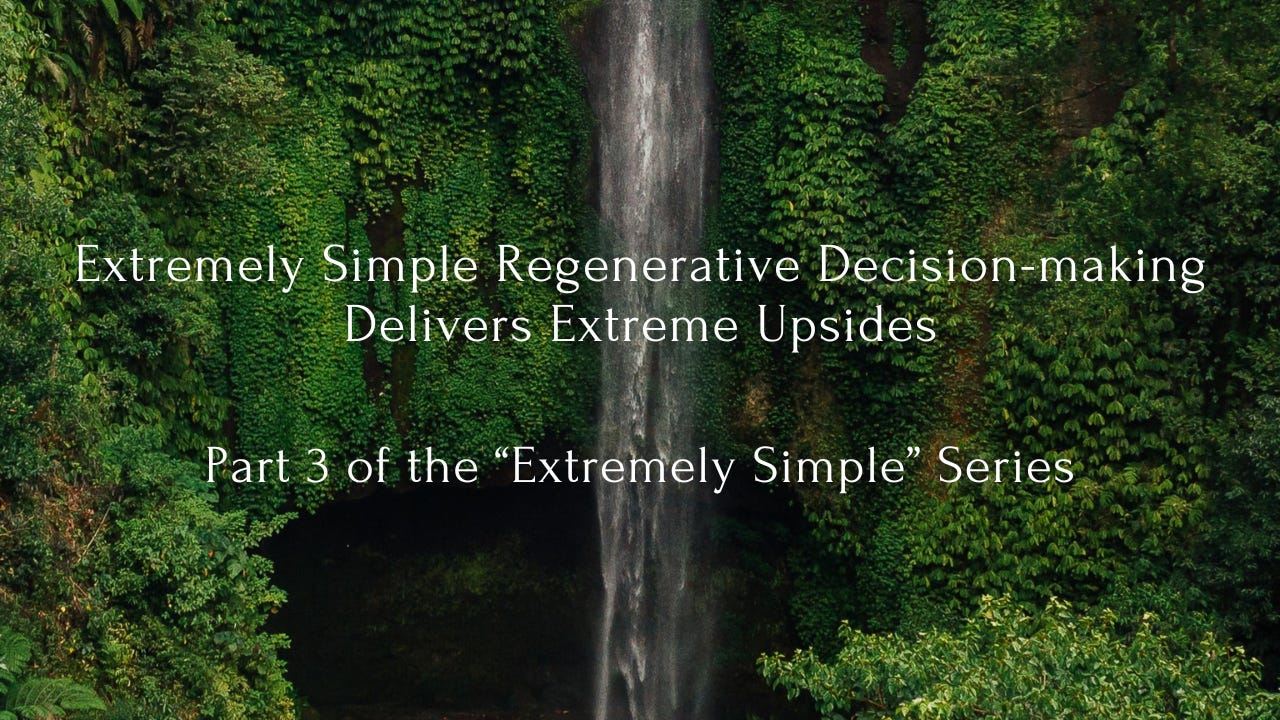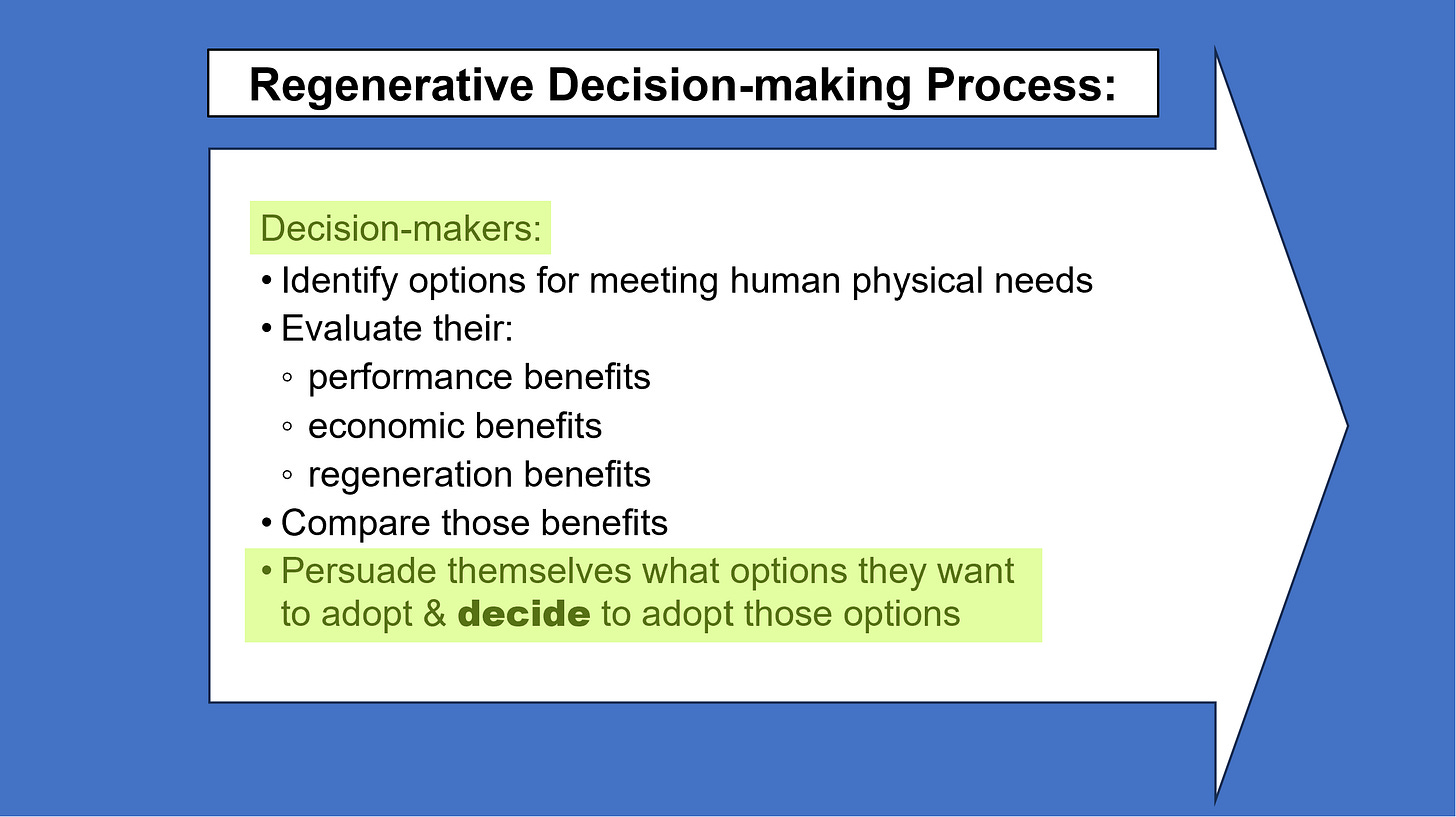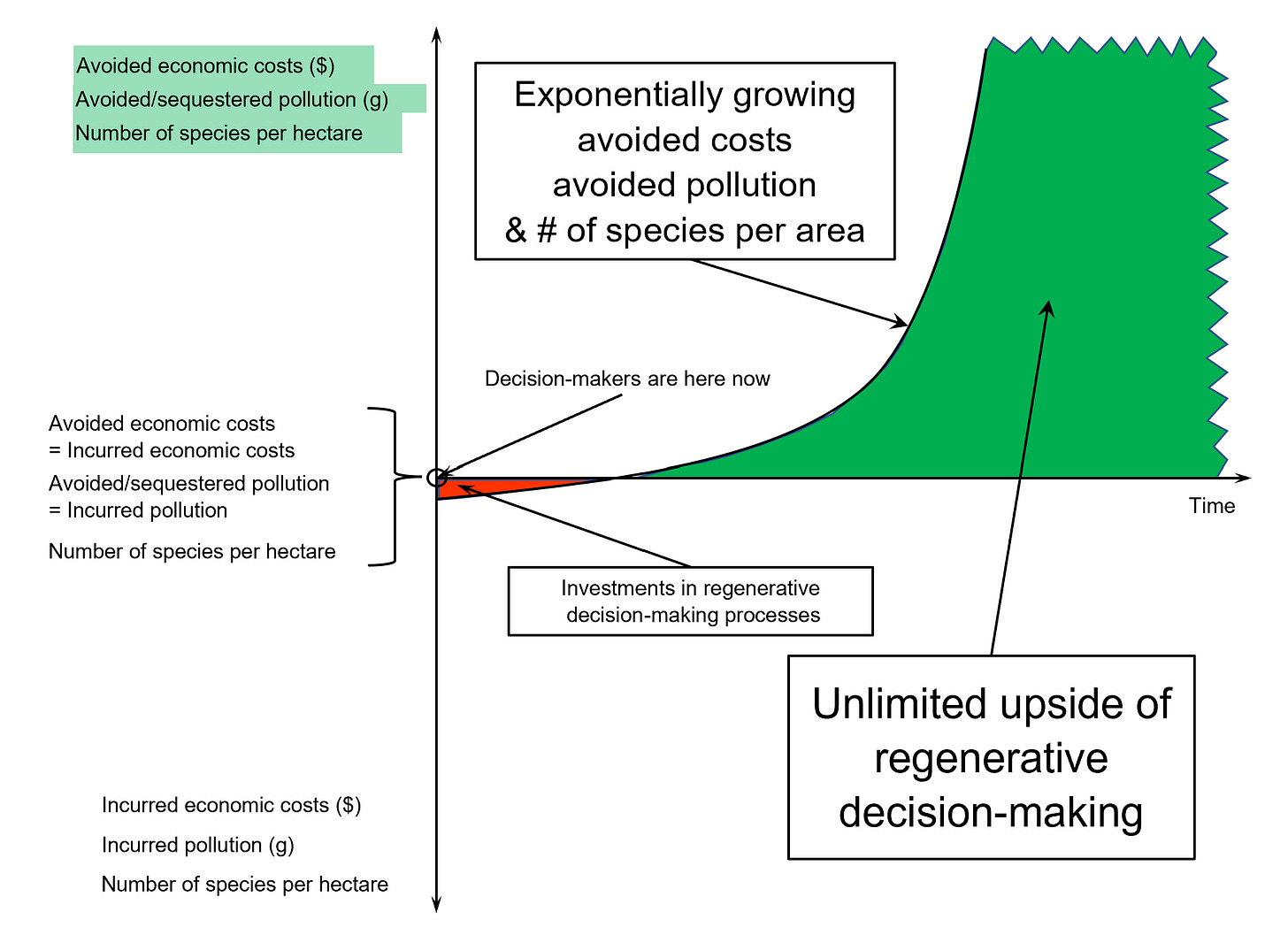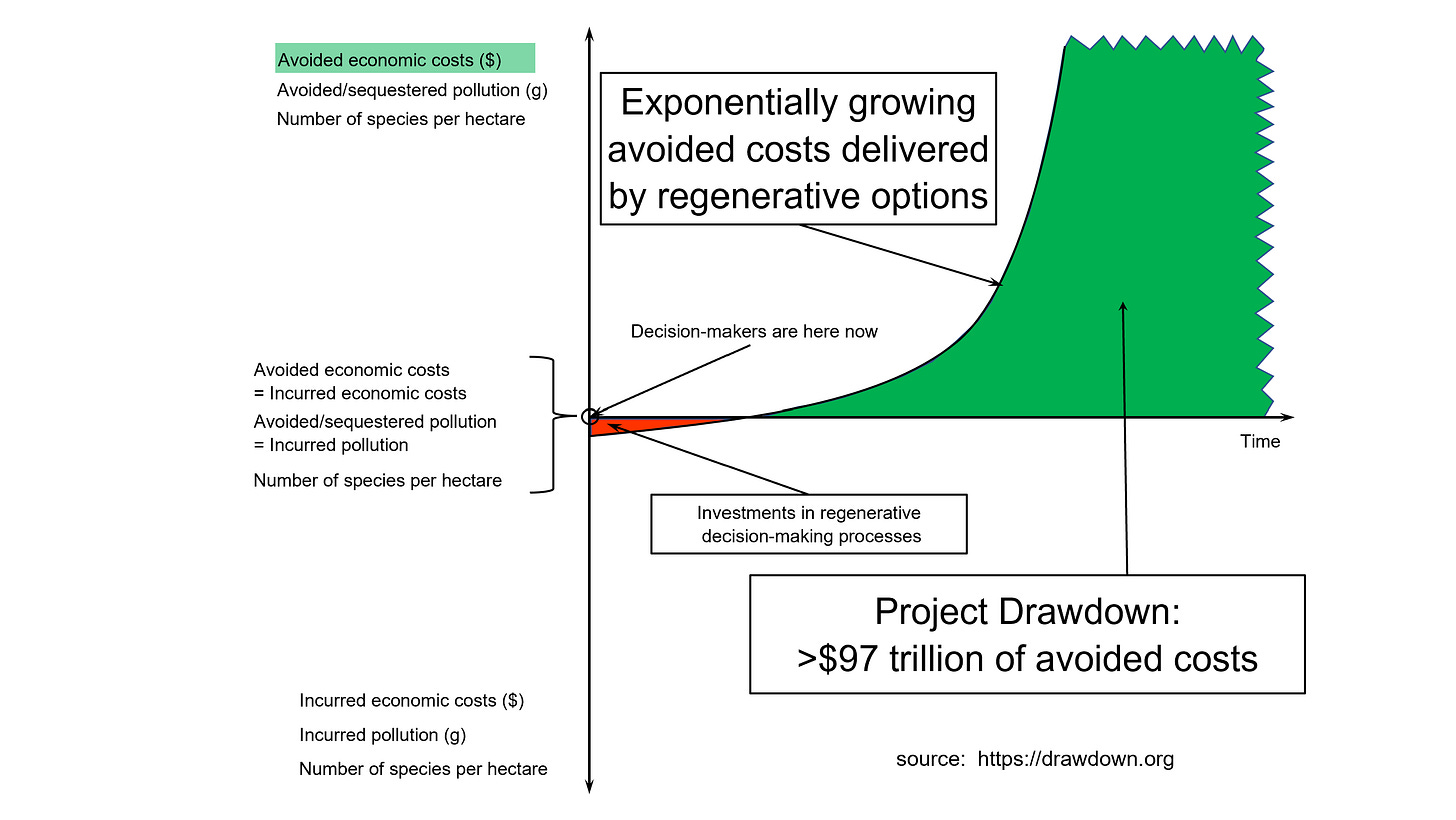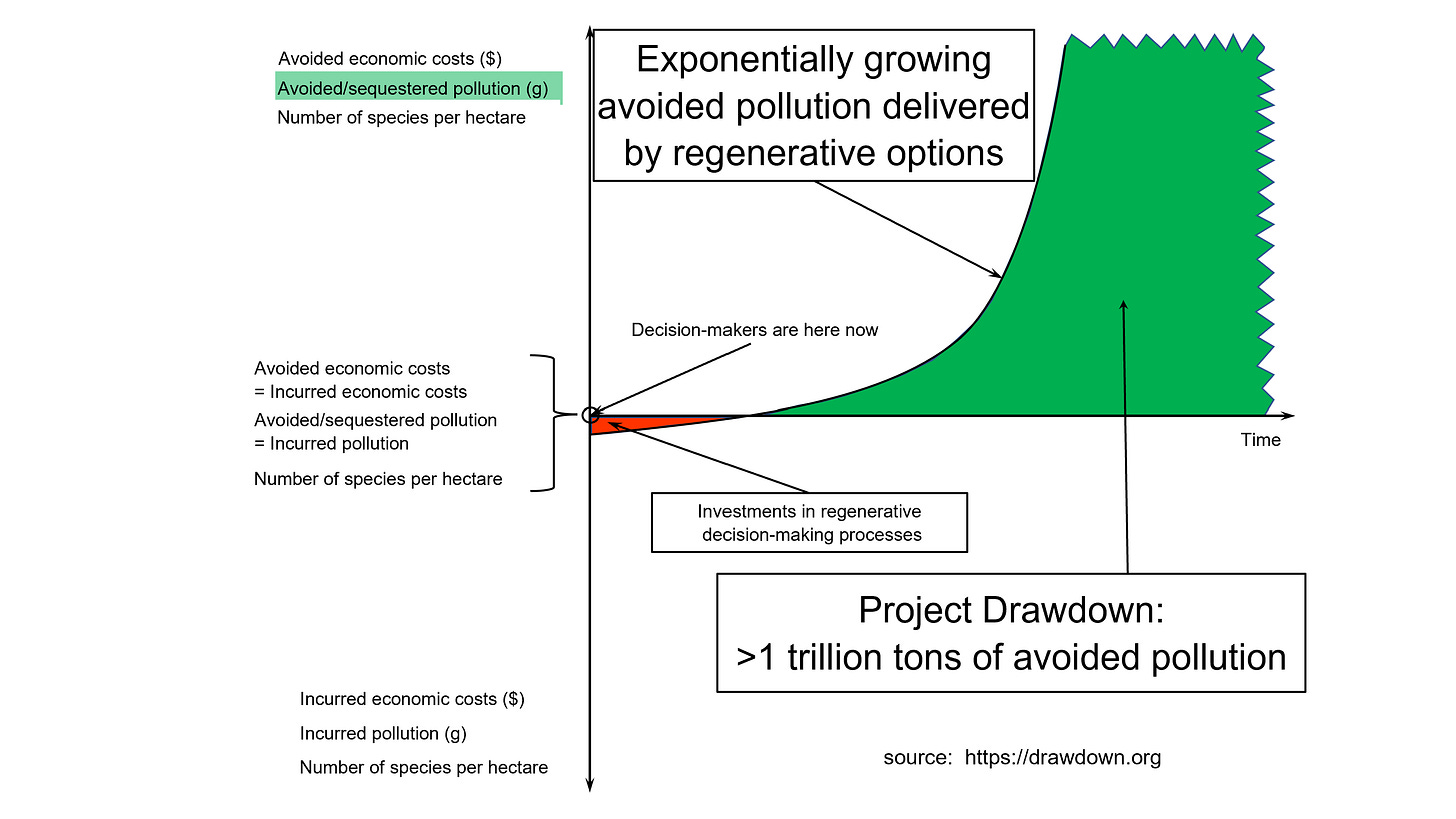Extremely Simple Regenerative Decision-making Delivers Extreme Upsides
Part 3 of the “Extremely Simple” Series
Steve Jobs was the master of extreme simplification, which is the essence of innovation. – Dan Sullivan & Benjamin Hardy
What if reversing the planet’s ecological crises as a whole (including the climate crisis) is a solvable problem?
What if reversing the planet’s ecological crises as a whole (including the climate crisis) is a practical and achievable goal?
In 10x Is Easier Than 2x, strategic coaches Dan Sullivan and Benjamin Hardy reveal the practicality of seemingly impossible goals:
Seemingly impossible or massive goals are highly practical because they immediately separate what works from what won’t, illuminating the few paths that have the greatest efficacy. …
Seemingly impossible goals are more practical than possible goals because impossible goals force you outside your current level of knowledge and assumptions. …
Reversing the planet’s ecological crises as a whole is a seemingly-impossible-but-practical goal because:
it forces one outside one’s current level of knowledge and assumptions about the problem, and
it forces one into an extreme simplification of the problem that illuminates the few paths (or processes) for solving the problem.
Steve Jobs said:
“Simple can be harder than complex: You have to work hard to get your thinking clean to make it simple. But it’s worth it in the end because once you get there, you can move mountains.”
My simple book, We Can Reverse the Planet’s Eco-crises, solves the problem of reversing the planet’s eco-crises as a whole (including the climate crisis) through:
1) extremely simplifying the problem of the planet’s eco-crises – in the form of an extremely simple mapping of the decision-making system for meeting human physical needs (called “the Human Enterprise”) that’s creating the planet’s eco-crises as a whole …
2) … using that mapping to design a process for solving the problem – in the form of an extremely simple decision-making process (called “regenerative decision-making”) – usable by people everywhere – for adopting “regenerative options” that scale back the extraction flows and pollution flows of the Human Enterprise …
3) … and using that regenerative decision-making process within an extremely simple Observe – Orient – Decide - Act (OODA) loop (called a “regenerative OODA loop”) – usable by people everywhere -- for adopting regenerative options at the exponential rate needed for reversing the planet’s ecological crises …
In Part 2 of this series, you learned how extremely simple regenerative decision-making shifts people everywhere to extreme upsides of:
exponentially growing avoided pollution flows
exponentially growing numbers of species per area, and
exponentially growing avoided costs delivered by regenerative options that people want to adopt …
How much avoided pollution might we be talking about in that “extreme upside” of exponentially growing avoided pollution flows?
How much avoided costs might we talking about in that “extreme upside” of exponentially growing avoided cost savings?
Project Drawdown showed that we have available to us – right now -- 93 kinds of regenerative options that – when widely adopted – were estimated to deliver an extreme upside of more than $97 trillion of avoided costs and more than 1 trillion tons of avoided carbon pollution …
In other words, Project Drawdown estimated those regenerative options to deliver an extreme upside on a scale of $97 trillion of avoided cost savings …
… and estimated those same regenerative options to deliver an extreme upside on a scale of 1 trillion tons (1000 gigatons) of avoided carbon pollution …
To win those “extreme upsides” through extremely simple regenerative decision-making, people everywhere are going to need a new & simple kind of information services – called “regenerative information services” -- in the form of:
accurate evaluations, comparisons and measurements
of performance benefits, economic benefits and regeneration benefits
of Things-We-Extract options and Things-We-Use options for meeting human physical needs …
To provide those regenerative information services and deliver those trillions of extreme upsides, entrepreneurs (like you) are going to be needed …
1) to design, build and use an extremely simple (but very large) database (called a “regenerative database”) containing:
performance data
incurred cost data
number of species per area data &
incurred pollution data
for Things-We-Extract options and Things-We-Use options on an option-by-option basis …
… and …
2) to design, build and use an extremely simple computer-implemented application (an “app”) – usable by people everywhere – for processing the data and delivering regenerative information services – to people everywhere -- in the form of:
accurate evaluations, comparisons and measurements
of performance benefits, economic benefits and regeneration benefits
of Things-We-Extract options and Things-We-Use options for meeting human physical needs …
From an investment point of view, reversing the planet’s ecological crises might look like entrepreneurs (like you) investing $9.70 billion in a regenerative database & app for delivering an extreme 100x upside in the form of $970 billion of regenerative information services[1] …
… and might look like entrepreneurs (like you) providing $970 billion of regenerative information services for delivering an extreme 100x upside in the form of $97 trillion of avoided cost savings and 1 trillion tons of avoided carbon pollution …
Reversing the planet’s eco-crises as a whole might look like extremely simple regenerative decision-making delivering extreme upsides on a scale of $97 trillion of avoided costs and 1 trillion tons of avoided carbon pollution.
Steve Jobs might have put it this way:
Simple can be harder than complex: You have to work hard to get your thinking clean [to make a simple map of the decision-making system that’s creating the planet’s eco-crises, to use that map to design a simple decision-making process for reversing the planet’s eco-crises, and to design, build & use a simple app & database allowing people everywhere to use that simple decision-making process for winning trillions of extreme upsides]. But it’s worth it in the end because once you get there, you can move mountains [and reverse the planet’s eco-crises as a whole].
[1] To put a nominal $970 billion market for regenerative information services in context, the market capitalization as of June 2020 for Google – the world’s 3rd largest provider of information services -- was approximately $980 billion. In other words, regenerative information services has the potential to be a trillion dollar information services industry on a par with Google.
In the next article of this “Extremely Simple” series, you will learn how extremely simple regenerative decision-making creates extraordinary career opportunities for reversing the planet’s eco-crises as a whole (including the climate crisis).
* * * *
When you read my simple e-book, We Can Reverse the Planet’s Eco-crises, you’ll learn:
an extremely simple mapping of the decision-making system for meeting human physical needs (called “the Human Enterprise”) that’s creating the planet’s eco-crises as a whole, and
an extremely simple decision-making process (called “regenerative decision-making”) for winning trillions in avoided cost savings and reversing the planet’s eco-crises as a whole.
When you read the articles in my Regenerative Decision-making newsletter:
… you’re giving yourself essential tools and skills for your successful career in reversing the planet’s ecological crises.
I’m super grateful for your likes, replies and shares.
Thank you for reading and aloha!
P.S. I cross-posted this article on Medium to give it greater reach.





